DAVID R. ROSS PRESS TRIBUTES |
THE TIMES 23rd Jan 2010 |
||
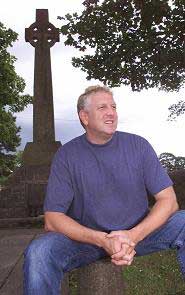 |
David Robertson Ross was convener of the Society of William Wallace and a passionate promoter of the memory and contemporary relevance of his hero, who defeated Edward I’s army at the Battle of Stirling in 1297. |
|
Inspired, however, by a remark that someone should write a book on Scotland’s Wallace sites, Ross wrote On the Trail of William Wallace, published by Luath Press in 1998. The passionate approach of the “Biker Writer”, as he became dubbed, proved popular and other books followed: On the Trail of Robert the Bruce; On the Trail of Bonnie Prince Charlie; A Passion for Scotland; Desire Lines: a Scottish Odyssey; For Freedom; On the Trail of Scotland’s History; and James the Good: the Black Douglas. To commemorate the 700th anniversary of Wallace’s capture and execution, in August 2005 Ross undertook a solitary “Walk for Wallace”, re-enacting Wallace’s journey in captivity from Scotland to London. After Ross arrived in London, a service with a coffin containing the “spirit” of Wallace was held at St Bartholomew’s Church in the City. The SNP leader, Alex Salmond, was present and declared that from “now to eternity on August 23 the saltire should fly at half-mast over every public building in Scotland”. Ross proclaimed that Wallace himself was perhaps present at the service. “Can you feel his presence?” he asked. The coffin, also containing prayers, poems and pledges of allegiance deposited by the assembled patriots, was taken from the church by tearful bearers, and, led by Ross, the procession moved slowly down Fleet Street, as bemused Londoners looked on. Ross was a familiar speaker at festivals and the Highland Games, and was frequently called upon by the media to give an opinion on Wallace (especially when anyone expressed reservations about Wallace as a hero) but remained unknown to most Scots. In the world of US-Scottish cultural societies, however, Ross’s imposing figure — he was 6ft 5in tall and well built — was a lauded presence on the speakers’ platforms at Scottish-themed events. Mark Twain famously blamed Walter Scott’s novels for causing the American Civil War by convincing Southerners that they were descended from noble, independent-minded Scottish clanspeople. Thanks in part to Ross, whose portrayal of Wallace was largely indistinguishable from Mel Gibson’s ferociously anti-English depiction of him in Braveheart (1995), Scottish culture became even more popular in the US. In 2009 Ross contributed to the making of the Blu-ray edition of Braveheart. To everyone’s surprise, Gibson announced at the launch of the edition that he had come to realise that the historical Wallace was in fact a “monster” with little in common with the Braveheart version. Ross was married and divorced twice and is survived by a daughter. David Robertson Ross, historian and Scottish patriot, was born on February 28, 1958. He died of a heart attack on January 2, 2010, aged 51 |
||
THE PAISLEY EXPRESS18th Jan 2010 |
||
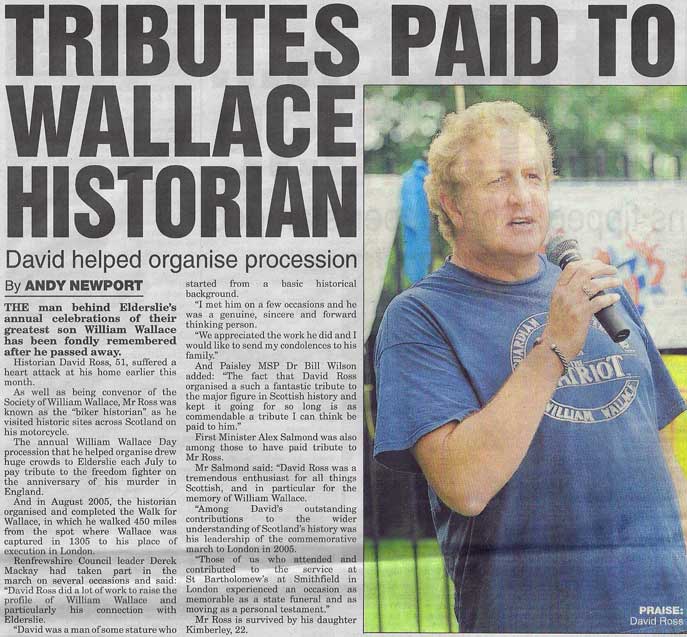 |
||
THE SUNDAY EXPRESS 17th Jan 2010 |
||
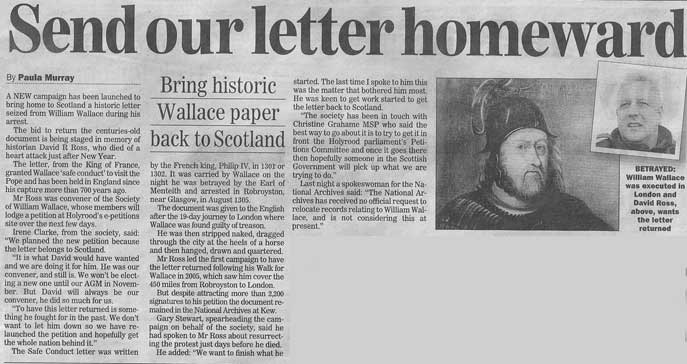 |
||
THE HERALD 15th Jan 2010 |
||
David Robertson Ross, who has died aged 51 of a heart attack, was an author and Scots historian whose career had its genesis in English history and motorcycles. |
||
THE HERALD 15th Jan 2010 |
||
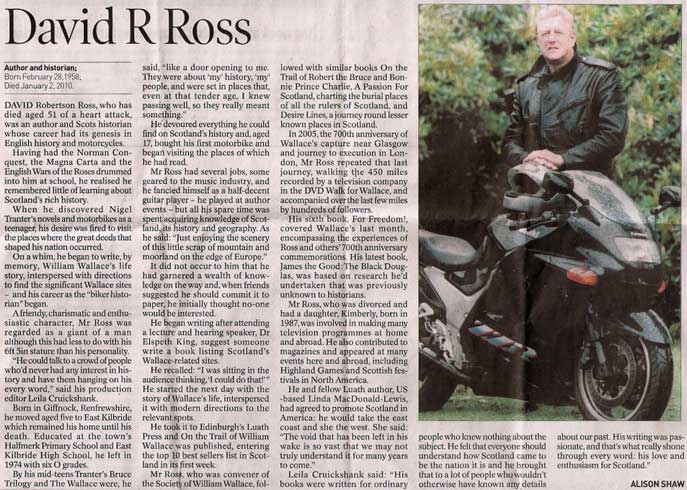 |
||
THE HERALD 15th Jan 2010 |
||
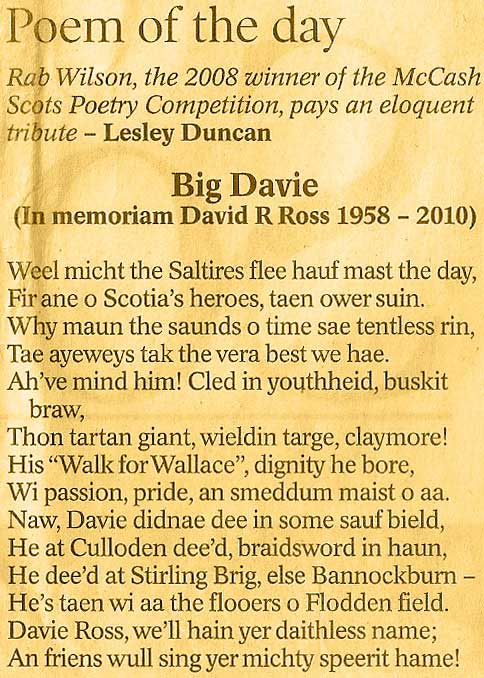 |
||
EAST KILBRIDE NEWS 13th January 2010 |
||
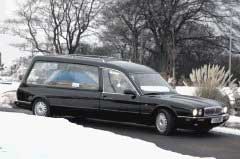 |
HIS coffin draped in the Saltire, author and historian David Ross was carried on his last journey by six kilted friends to the tune of ‘Scots Wha Hae’ on the bagpipes. Hundreds of mourners travelled from far and wide to pay their respects, so many that people were standing in the aisles and entrance hall to hear tributes led by David’s friends Humanist celebrant Jim McQuiston and well-known Scottish singer/songwriter Ted Christopher. |
|
And since his sudden and tragic death as the result of a heart attack at his home in the Village in East Kilbride on Saturday, January 2, at the age of just 51, thousands of people from every corner of the globe have taken the time to pay tribute to a man the whole of Scotland has good reason to mourn. David, with his passion for Scotland, was a wonderful ambassador for his beloved country. So it was not surprising therefore that among the tributes was one from Scotland’s First Minister Alex Salmond, who described David as “a tremendous enthusiast” for all things Scottish and, in particular, for the memory of William Wallace. Through his books – the ninth of which he completed shortly before his death – his programmes for television and radio, his talks and his public appearances both here in Scotland and further afield, notably in the United States and Canada, David – in the words of his friends – inspired “thousands of people to acknowledge who we are as a nation”. Born in Giffnock on February 28 1958, David’s family moved to East Kilbride when he was five and he attended Halfmerke Primary and East Kilbride High School. One of his favourite subjects was history but he was frustrated at the fact it was mainly English history. As a teenager he was inspired by the novels of Nigel Tranter to learn more about Scotland’s history and, at 17, he bought his first motorcycle and started to visit all the places he had read about. Over the years his penchant for using his motorcycle to get him about sites of historical interest earned him the nickname of the ‘biker historian.’ His first book, entitled “On the trail of William Wallace” was published in 1999 and within a week was on the top ten bestsellers list in Scotland. From then on David was regularly in the headlines travelling extensively to appear at meetings, highland gatherings and other events throughout the world. An accomplished musician, keep fit enthusiast, friend and confidant, and for his good humour, sense of fun and fantastic knowledge, there are many aspects of David’s character for which he will be fondly remembered. He was involved, too, in a number of organisations, notably as convener of the Society of William Wallace. And it is perhaps his Walk for Wallace for which David will be best remembered. In August 2005 he walked the 450 miles from the spot where Wallace was captured in 1305 to his place of execution in London. It was a journey closely followed by Scots patriots all over the world, including Sir Sean Connery, who telephoned David several times during the walk. The funeral service David organised at St Bartholomew’s Church at Smithfield near the site where Wallace was executed was attended by hundreds of people, including Alex Salmond, and broadcast worldwide. Afterwards David brought home a coffin containing Wallace’s “spiritual remains” in the form of letters from Scots patriots, to Lanark for burial. ‘I’m Coming Home’, a song written by Ted Christopher for that service was one of two songs played by Ted at David’s funeral, the other being ‘Caledonia’. As his friends said: “David was a giant of a man in so many more ways than his physical stature. No man loved his country more and he made sure everybody knew it .” Perhaps the only thing he loved more, was his daughter Kimberly and our heartfelt condolences go out to her and their extended family. As David’s friends said he had so much more he wanted to do, so many plans and they have pledged to try and carry his dreams forward. |
||
THE SUNDAY EXPRESS 10th January 2010 |
||
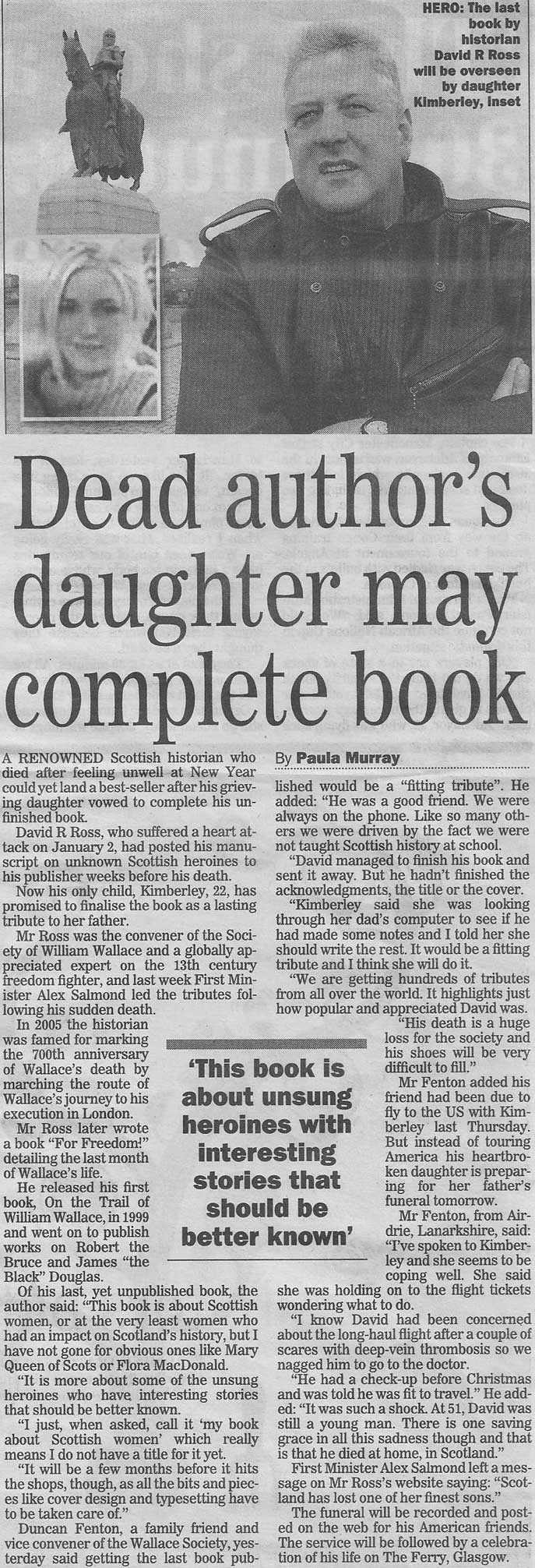 |
||
THE SUNDAY MAIL 10th January 2010 |
||
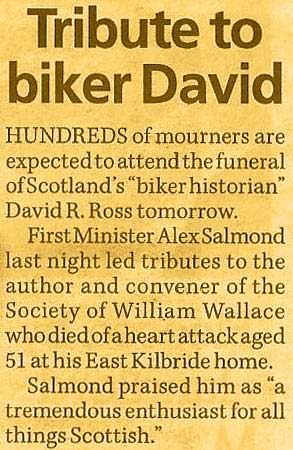 |
||
THE SCOTSMAN 9th January 2010 |
||
DAVID R Ross, who has died suddenly of a heart attacked aged 51, became known as "the biker historian" after writing a string of highly acclaimed books on Scottish history, notably about William Wallace. For his research, he travelled his native land in full black leathers on his black Kawasaki ZZR motorcycle. At 6ft 5in tall, and in the kilt when not in leathers, he was often told he'd have made a far better Wallace in Braveheart than "that wee Aussie". |
||
THE BBC WEBSITE January 2010 |
||
| A historian famed for marking the 700th anniversary of the death of William Wallace by marching the route of his journey to execution has died. David Ross, 51, a writer and convenor of the Society of William Wallace suffered a heart attack at his home in East Kilbride. He was known as the "biker historian" as he visited historic sites across Scotland on his motorcycle. First Minister Alex Salmond is among those who have paid tribute to Mr Ross. A message on the historian's official website said "Scotland has lost one of her finest sons." It added: "He was a giant of a man in so many more ways than his physical stature. "No man loved his country more and he made sure everybody knew it with an incredible passion for both its history and its future. "Mr Ross released his first book, called On the Trail of William Wallace, in 1999. He went on to write other books about Robert the Bruce, James "The Black Douglas" and other Scottish heroes. In August 2005 the historian organised and completed the Walk for Wallace, in which he walked 450 miles from the spot where Wallace was captured in 1305 to his place of execution in London. He then held a funeral service for Wallace, attended by hundreds of Scots and later wrote a book "For Freedom!", charting the last month of Wallace's life. Mr Salmond said: "David Ross was a tremendous enthusiast for all things Scottish, and in particular for the memory of William Wallace. "Among David's outstanding contributions to the wider understanding of Scotland's history was his leadership of the commemorative march to London in 2005. "Those of us who attended and contributed to the service at St Bartholomew's at Smithfield in London experienced an occasion as memorable as a state funeral and as moving as a personal testament." Mr Ross is survived by his daughter Kimberley, 22. | ||
| © Society of William Wallace 2007-2026 | The Society of William Wallace is a Scottish Charitable Incorporated Organisation Registration number SC045959 |
